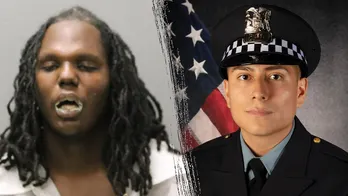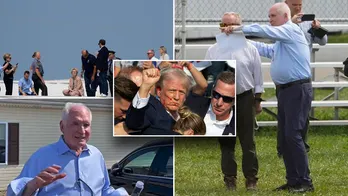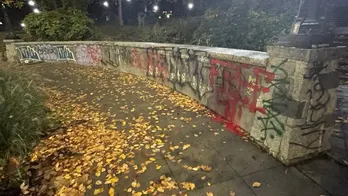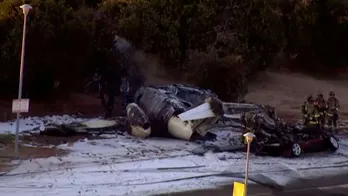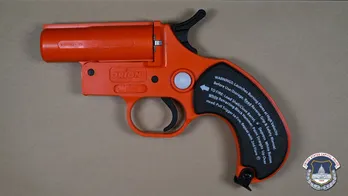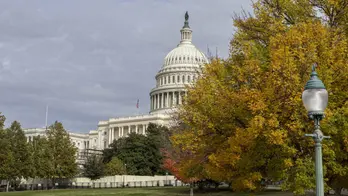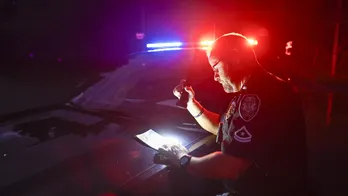NY prosecutors reveal 'another crime' Trump allegedly tried to conceal with falsified business records
New York prosecutors on Tuesday revealed the other crime they claim former President Trump was trying to conceal when he allegedly falsified his business records.
Manhattan District Attorney Alvin Bragg charged Trump with 34 counts of falsifying business records in the first degree. In order for prosecutors to secure a criminal conviction, they must convince the jury that Trump allegedly committed the crime of falsifying business records in "furtherance of another crime."
TRUMP TRIAL: FORMER PRESIDENT 'INNOCENT,' SAYS DEFENSE AS DA ALLEGES 'CRIMINAL CONSPIRACY'
Trump pleaded not guilty to all 34 counts.
New York prosecutor Joshua Steinglass on Tuesday said the other crime was a violation of a New York law called "conspiracy to promote or prevent election."
Prosecutors will try to prove that the alleged conspiracy was to conceal a conspiracy to unlawfully promote his candidacy.

Prosecutor Matthew Colangelo makes opening statements as former U.S. President Donald Trump watches with his attorney Todd Blanche before Justice Juan Merchan during Trump's criminal trial on charges that he falsified business records to conceal money paid to silence porn star Stormy Daniels in 2016, in Manhattan state court in New York City, U.S. April 22, 2024 in this courtroom sketch. (REUTERS/Jane Rosenberg)
"Any two or more persons who conspire to promote or prevent the election of any person to a public office by unlawful means and which conspiracy is acted upon by one or more of the parties thereto, shall be guilty of a misdemeanor," New York Law 17-152 reads.
Prosecutor Matthew Colangelo, during his opening argument Monday, said the case against Trump "is about a criminal conspiracy and a cover-up."
Colangelo argued that months after Trump announced his candidacy for president in June 2015, he invited former CEO of American Media Inc. (AMI) David Pecker to Trump Tower for a meeting. His then-attorney and "fixer" Michael Cohen was also at the meeting. AMI owned the National Inquirer.
"Those three men formed a conspiracy to influence the election," Colangelo argued.
Colangelo claimed Cohen paid Daniels $130,000 to "silence" her and make sure the public did not learn of an alleged sexual encounter with Trump. Colangelo claimed that after the election, Trump reimbursed Cohen through a series of monthly checks from his businesses but claimed that he disguised those payments as payments for legal services.
Colangelo alleged that Pecker, Cohen and Trump "conspired to influence the 2016 presidential election," and said Pecker would gather harmful information and prevent it from going public. Colangelo alleged he only published flattering stories about Trump and negative stories about opponents.
Colangelo claimed that the men used a practice called "catch & kill," saying they bought damaging information, had the seller of that information sign a non-disclosure agreement and then blocked the information from being published.

Former president Donald Trump arrives to court on the first day of opening arguments in his trial at Manhattan Criminal Court in New York, Monday, April 22, 2024. (Victor J. Blue/The Washington Post via AP, Pool)
Colangelo said the practice was used three times — once to block a story a former Trump Tower doorman was trying to sell about an alleged out-of-wedlock child. Colangelo said the payment was $30,000. The doorman’s story was eventually proven to be untrue.
BRAGG SAYS HE WILL TRY TO 'DISCREDIT' TRUMP IF HE TESTIFIES IN HIS DEFENSE DURING CRIMINAL TRIAL
The next payment was to former Playboy model Karen McDougal, who claimed a romantic and sexual relationship with Trump. Colangelo alleged that Cohen asked AMI to buy the story. Colangelo said AMI paid McDougal $150,000 in exchange for "unlimited life rights" to her story.
Colangelo also alleged there was a payment made of $130,000 to Daniels.
Colangelo said that when it came time to pay Cohen back, Trump "didn’t negotiate the price down — he doubled it." Colangelo alleged that his "willingness to do this shows the importance of hiding the payments" and alleged "overall election conspiracy."
But Trump defense attorney Todd Blanche rejected the prosecution's argument, declaring: "President Trump is innocent."
"None of this was a crime," Blanche said. "People say that Trump is trying to cover up payments — think… President Trump did not pay Cohen back $130,000. He paid Cohen $420,000."
He added, "Would a frugal businessman repay a $130,000 debt to the tune of $420,000?"

NEW YORK, NEW YORK - MARCH 21: Manhattan District Attorney Alvin Bragg.
Blanche said that the money "was not a payback," and said Trump, in 2017, after the election, was paying legal fees.
He added, "I have a spoiler alert — there is nothing wrong with trying to influence an election. It’s called democracy. They put something sinister on it."
NY VS TRUMP: THE EVIDENCE PROSECUTORS CAN PRESENT IF FORMER PRESIDENT TESTIFIES
Blanche argued that Cohen paying Daniels "was not illegal" and said that entering into a non-disclosure agreement was also not illegal, saying companies "do that all the time."
CLICK HERE TO GET THE FOX NEWS APP
"There is nothing illegal about it," Blanche said, arguing that Daniels was attempting to try to embarrass Trump with "all sorts of allegations" that could be "damaging to him and damaging to his family."
"Trump fought back to protect his family, reputation, brand," Blanche said. "And that is not a crime."
Disclaimer: The copyright of this article belongs to the original author. Reposting this article is solely for the purpose of information dissemination and does not constitute any investment advice. If there is any infringement, please contact us immediately. We will make corrections or deletions as necessary. Thank you.
